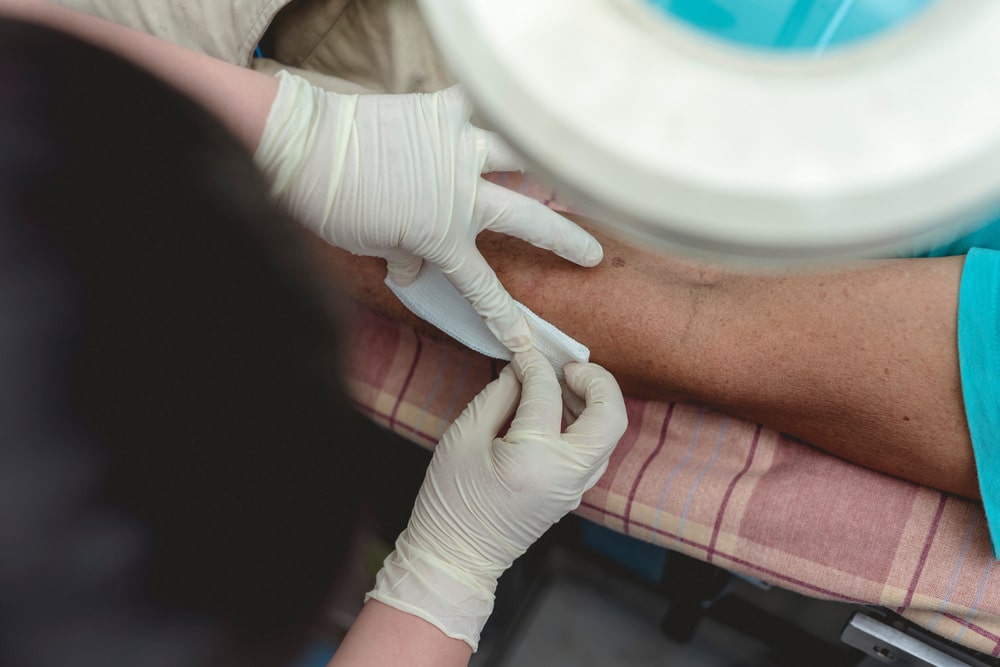
Dog bites are an unfortunate reality for many Californians, with thousands of incidents reported each year. These attacks can result in severe physical injuries, emotional trauma, and long-term financial consequences.
Whether you suffered a bite while walking in your neighborhood or visiting someone’s property, it’s crucial to understand the types of dog bite wounds you might sustain and how to protect your legal rights.
At Weinberg Law Offices, we understand the challenges dog bite victims face. Here, we’ll explore California’s five most common dog bite injuries and how our firm can help you secure the compensation you deserve.
Types of Dog Bite Wounds
Dog bites can leave various types of wounds and injuries. Let’s review the most common ones we see.
1. Puncture Wounds
Puncture wounds are one of the most frequent injuries caused by dog bites. These occur when a dog’s teeth penetrate the skin, often creating deep and narrow wounds. While they may appear minor initially, puncture wounds carry a high risk of infection because bacteria can be forced deep into the tissue. Complications from puncture wounds can include:
- Risk of infection,
- Nerve damage or damage to underlying tissues, and
- Scarring or disfigurement requiring surgical repair.
Victims with puncture wounds often experience localized pain, swelling, and difficulty moving the affected area. If untreated, these injuries can worsen, leading to long-term functional impairments. Proper cleaning and medical care are essential to prevent complications.
2. Lacerations and Tearing Injuries
Lacerations are deep cuts or tears in the skin caused by a dog’s teeth or claws. Unlike puncture wounds, these injuries often involve jagged edges that can result in significant blood loss and visible scarring. Lacerations can also damage underlying structures such as muscles, tendons, or nerves, leading to long-term complications. Common treatments include:
- Stitches or sutures to close wounds;
- Reconstructive surgery for extensive damage; and
- Physical therapy to restore function if nerves or muscles are affected.
Some victims may experience ongoing pain or sensitivity in the area even after the laceration heals. For injuries involving the face or hands, reconstructive surgery might be necessary to restore appearance or functionality.
3. Infections and Complications
Many dog attack injuries result in infections due to the bacteria in a dog’s mouth. Common infections include Pasteurella, MRSA, and Capnocytophaga, all of which can cause serious health complications if not treated promptly. Signs of an infection include:
- Redness, swelling, or warmth around the wound;
- Fever, chills, or fatigue; and
- Pus or unusual discharge from the wound site.
Infections can spread quickly, leading to symptoms like fever, redness, swelling, or systemic conditions like sepsis. Long-term infections can result in abscesses requiring surgical drainage or, in severe cases, permanent tissue damage. Proper wound care is critical after a dog bite, but even with prompt treatment, some victims face long-term health issues.
4. Crush Injuries and Broken Bones
Bigger dogs have powerful jaws capable of exerting significant force. In severe cases, this can lead to crushing injuries or broken bones, particularly in areas like the hands, arms, or legs. Crush injuries occur when a dog’s bite compresses muscles, tissues, or bones, potentially causing nerve damage, tissue death, or dislocations.
Larger breeds, such as German Shepherds or Rottweilers, are more likely to cause these injuries, leading to prolonged recovery periods and permanent disabilities. Victims may require extensive medical treatment, including surgery, physical therapy, or the use of assistive devices during recovery.
5. Emotional Trauma and Psychological Injuries
The emotional toll of a dog attack is often underestimated but can be just as debilitating as physical injuries. Many victims develop post-traumatic stress disorder (PTSD), anxiety, or a persistent fear of animals after being attacked. Children are particularly vulnerable to long-term psychological effects, which can interfere with their social development and daily life.
Recovering from emotional trauma often requires counseling or therapy. For children, specialized therapy can help them process the attack in a healthy way and regain confidence.
Legal Rights for Dog Attack Injuries in California
California’s dog bite laws operate under strict liability, meaning dog owners are held responsible for injuries caused by their pets, regardless of whether the dog has a history of aggression. This legal framework simplifies the process for victims but does not eliminate the need for strong evidence to support a claim.
Steps to take after a dog bite include seeking immediate medical attention, reporting the incident to local authorities, and documenting the injuries and circumstances of the attack. Working with a California dog bite lawyer gives you the legal guidance to navigate these steps effectively and pursue full compensation.
Frequently Asked Questions
What Should I Do Immediately After a Dog Bite?
Seek medical attention immediately, even if the injury seems minor, as infections are common with dog bites. Report the attack to local animal control or law enforcement to create an official record. Take photos of your injuries and the scene, and gather witness contact information. Avoid making statements about fault to the dog’s owner until consulting an attorney.
Can I Sue a Dog Owner If the Dog Has Never Bitten Anyone Before?
Yes. Under California’s strict liability law, dog owners are responsible for injuries caused by their pets, regardless of prior behavior. If a dog bit you in a public place or while lawfully on private property, you have the right to pursue compensation for your injuries.
What Damages Can I Recover After a Dog Bite Injury?
Damages can include medical expenses, lost wages, and compensation for pain and suffering. For severe cases, victims may also seek reimbursement for reconstructive surgery, therapy for emotional trauma, or other long-term care costs.
How Long Do I Have to File a Claim for a Dog Bite in California?
California law allows victims to file dog bite claims within two years of the incident. Missing this deadline may prevent you from recovering compensation.
Call (818) 697-1079 or complete a Free Case Evaluation form
Contact a California Dog Bite Lawyer | 100% Free Consult
Common dog bite injuries can have devastating physical, emotional, and financial consequences. Understanding the types of dog bite wounds and seeking timely medical and legal help is critical to your recovery.
At Weinberg Law Offices, we are committed to helping dog bite victims in California secure the compensation they deserve. If you or a loved one has been injured in a dog attack, don’t wait—contact us today to schedule a consultation and take the first step toward justice.
Where You Can Find Our Los Angeles Office
Disclaimer: This content should not be construed as legal advice.

